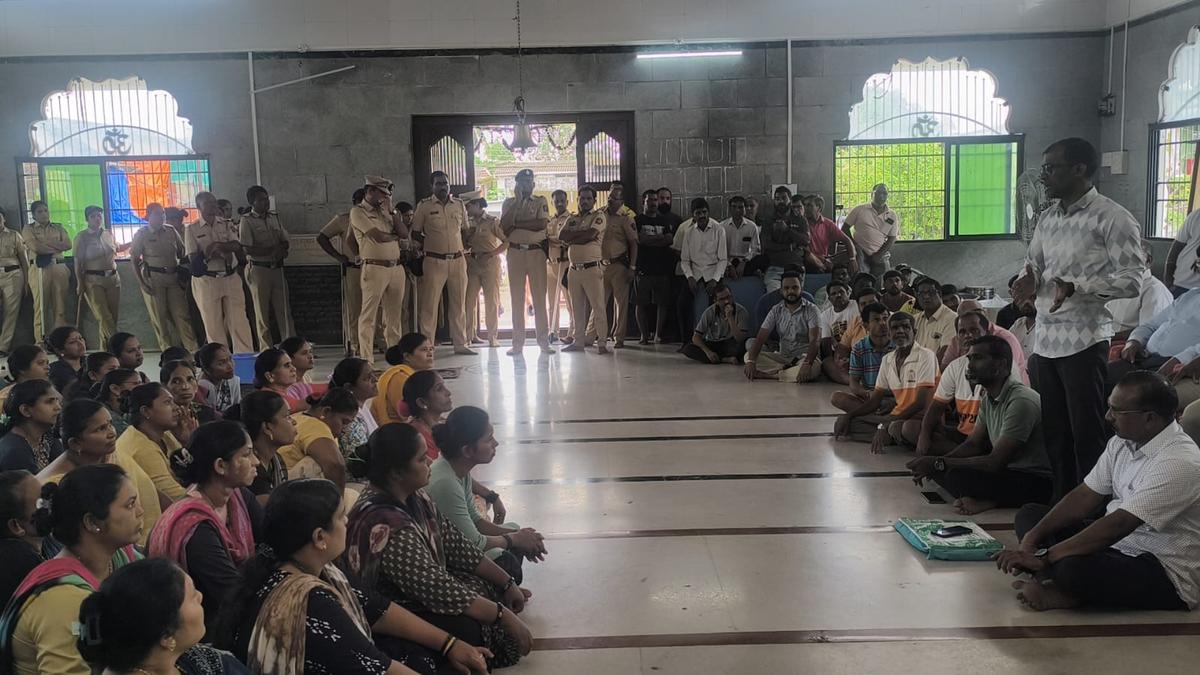Despite directions from the Bombay High Court for timely rehabilitation, residents of the Shewa Koliwada transit camp allege intimidation by the authorities. On September 18, 2025, seven large police vans arrived during a meeting between the villagers and district authorities. Residents claim the show of force was meant to discourage them from pursuing their case in court.

A senior police officer denied the allegations, stating the force of 100 officers was deployed solely to protect the District Collector’s representative, and the residents, and to prevent any scuffle that could have occurred during the meeting.
In 1984, all the villagers of Shewa Koliwada handed over their homes and lands for a port to be developed on the shores of the Arabian Sea in Navi Mumbai. The families still struggle in temporary housing amid unsanitary conditions. When the Jawaharlal Nehru Port Trust township project came up in the same year, the people of Shewa Koliwada were moved to two transit camps 12 km away, at their current location.
Residents cry foul
The displaced families, living in transit accommodation for over 40 years, said the police deployment was unjustified.
“There were seven large police vans that are used to detain people,” Ramesh Koli (66), president of the Shewa Koliwada Samajik Gramvikas Mandal. “They tried to intimidate us so that we withdraw our case. But we refused to bow down to corrupt officials who betrayed us for four decades. On May 9, 2025, we had a similar situation. A large number of police were deployed, and they were forcing us to form an illegal gram panchayat. This intimidation by the authorities is shameful as we, the poor fishing community, gave away our everything for a national port project only to be betrayed for decades,” Mr. Koli said.

The police remained from 9:30 a.m. to 3 p.m., causing distress among residents. Community leaders alleged a conspiracy by Jawaharlal Nehru Port Authority (JNPA) authorities; the City and Industrial Development Corporation (CIDCO) of Maharashtra; and the Raigad District Collector to instill fear and obstruct their plan to submit a signed petition opposing the rehabilitation scheme, and demanding a First Information Report (FIR) against the responsible officials.
Letter to CM
On September 19, the residents wrote to Chief Minister Devendra Fadnavis demanding disciplinary action against the officials who had authorised the heavy police deployment. “We also demand transparency in revealing how much was spent on deploying so many police officers and vans,” Mangesh Anant Koli, vice president of the residents’ collective, said.

The letter marked to the Governor of Maharashtra stressed that villagers had been protesting peacefully for 43 years through court petitions and Right to Information applications. It sought disciplinary action under Section 5 of the Maharashtra Civil Services (Discipline and Appeal) Rules, 1979, and the registration of an FIR under the Bharatiya Nyaya Sanhita for fraud, deceit, harassment, and conspiracy. It also held the District Collector, and the JNPA Chairman responsible for any future disturbances to law and order.
Rehabilitation deadline
On September 4, 2025 the Bombay High Court directed the JNPA to complete the rehabilitation process for project-affected families by December 2025. A Division Bench of Justice Sandesh D. Patil and Justice Revati Mohite Dere are hearing the residents’ petition.
The JNPA’s counsel told the court that the proposal had cleared multiple rounds of approvals and was now with the Departments of Expenditure and Economic Affairs. The court recorded the JNPA’s assurance that the Union Cabinet would take a final decision by December. The court adjourned the matter to December 22.
‘False narrative’
On September 6, residents issued legal notices to Saamana, mouthpiece of the Shiv Sena-Uddhav Balasaheb Thackeray or UBT, Marathi daily Lokmat, and Shiv Sena (UBT) chief Uddhav Thackeray. They alleged that reports published on September 4 misrepresented facts about the number of affected families, land allotment, and progress in rehabilitation, creating “serious confusion and unrest”.
The notices further objected to Shiv Sena (UBT)’s official social media handles amplifying these reports with politically motivated commentary.
The notices cite defamation (Sections 499 and 500 of the erstwhile Indian Penal Code or IPC), public mischief (Section 505 of the IPC), civil liability for damages, violation of Press Council of India norms, and prejudicial interference in a sub judice matter. They demand withdrawal of the reports and posts, public apologies and corrections, disclosure of sources, and compensation for mental harassment.
Failing compliance, residents warned of filing defamation suits, approaching the Press Council of India, moving contempt petitions in the Bombay High Court, and seeking action from the Election Commission of India for the misuse of various platforms.
Published – September 22, 2025 06:21 pm IST



